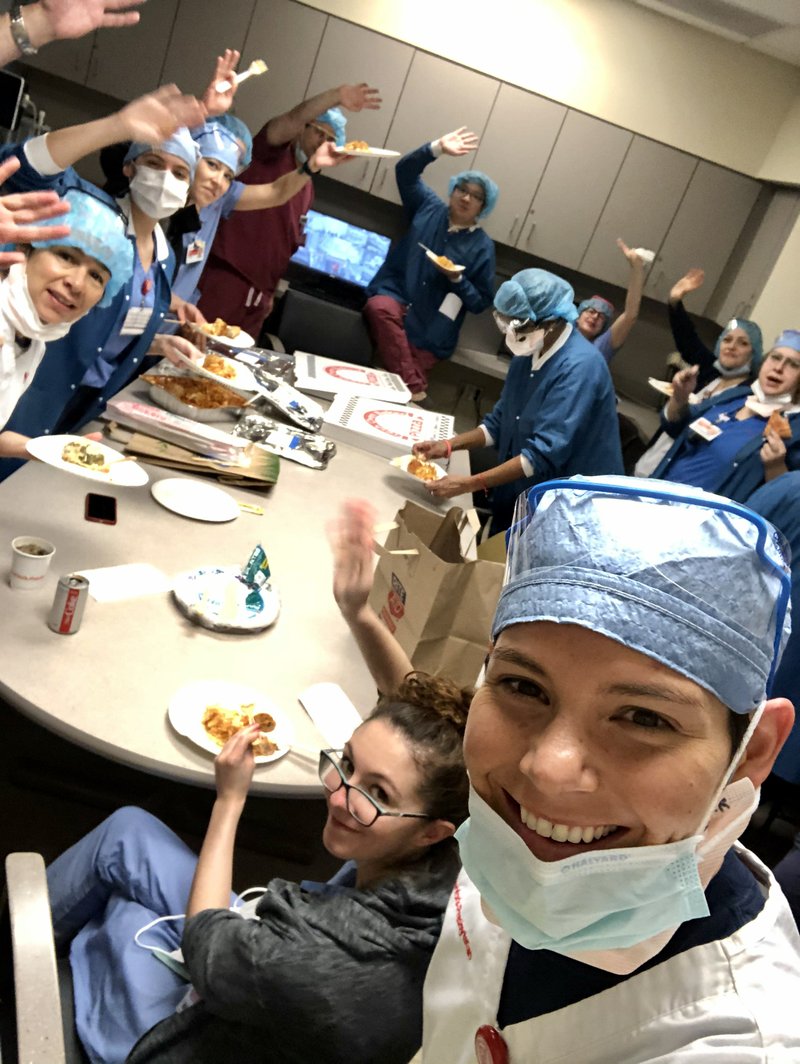Although the hours were incredibly long and grueling, Teresa Ritchie said the emotional drain was what made the situation so difficult. The families weren’t allowed to see the patients, sometimes for just one last time.
“It was just so hard. Our hospital, once it turned COVID, family members weren’t allowed in. It was a strict, employees only could enter this hospital,” Ritchie explained. “This hospital is big. It’s one of the largest hospitals within the city itself. Not to allow any visitors to come into the hospital … and sometimes the patient is removed or transferred to different hospitals three or four times. I can’t imagine what the families were going through to try to find their loved ones. That level of stress and uncertainty for them is something I don’t know if I could ever experience. My heart goes out to them. As much as I would want to communicate with them, it was just a hard thing to do.”
The reward of watching patients recover from open heart surgery soon became a distant memory for Ritchie. The COVID patients, now, had turned into bodies with name tags.
“When they come into our ICU, they are already incubated and heavily sedated. So, there’s no interaction. They’re not consciously aware of where they are. That level of personal connection was ripped away. There was no such connection, which was also very different,” she said.
“I don’t know anything about this patient, no idea who they are. There’s just a first name, a last name. I know they’re COVID positive. I know we’re doing this, this and this. And we’re a 20-bed ICU. Every patient in that unit, they look the exact same. Their clinical picture is the exact same. It was the weirdest thing ever. Whenever they’re on the ventilator, their ventilators are all the same. They’re in that disease process called ARDS (Acute respiratory distress syndrome). With that type of lung disease, the ventilator settings have to be very specific. They’re very specific for all 20 of them. And their levels of medication were all the same, too.”
And then, there were the family members. Dealing with the death of a loved one coupled with not being able to say goodbye, Ritchie had to often serve as the mediator for the final moments.
“Can I empathize with the family? Of course. My heart goes out to them. It’s a lot,” she said. “Unfortunately, when they pass away that puts on a whole other level of heartbreak, too. It’s like nothing I’ve ever seen before, too, that kind of handling of death was really unprecedented.”
***
Ritchie’s last day of work at the hospital was scheduled to be on Thursday, May 28. She said she’s been accepted into Columbia University’s program, where she will go for her Masters degree in June to become a Certified Registered Nurse Anesthetists.
A nurse anesthetist is an advanced practice nurse who administers anesthesia for surgery or other medical procedures.
“I’m looking forward to it. I’ve been in this particular ICU for almost eight years. That’s a long time. But I think it has prepared me for transitioning to this next step,” said Ritchie. “I’m excited about that. It will be, obviously, very different from what I’m doing, right now. It’s a two-year program. But I’m excited.”
Of course, there are other emotions, too, perhaps a tinge of guilt, leaving the battle before victory has been declared.
“My family has heard me go through this whole struggle. Up until about a week ago, I was saying, ‘Is this really what I want to do?’ I don’t know if I want to give up being a bedside ICU nurse. Because I love it. I love it so much,” Ritchie said. “As crazy and traumatic as everything has been, I love my job. I love that hands on approach. I love being in the trenches. I love being the frontline. My dad told me, there’s no wrong decision you’re going to make. As much as I’m going to miss being a bedside nurse, I know this will be a different opportunity. It comes at a very interesting time, that’s for sure.”
And what if another wave of the virus strikes? Ritchie already postponed one of her prerequisites, organic chemistry, during the heat of the battle.
“If it does come back, I would want to be there to help. I would probably strongly consider it,” she said. “If it becomes as heavy as it was these past few months, I would probably work two or three times a week, try to be helpful.”
Of course she would. After all, whether in a burn unit, open heart or COVID care, Ritchie is still a nurse. Putting others before herself, well, that’s the job.
Always looking for the next challenge, she admitted, this last one was a doozy.
“I can tell you, it’s changed me,” Ritchie said. “It will stay with me for the rest of my life, this experience and everything I’ve witnessed inside of those rooms. My co-workers that are standing beside me, they will stay with me for the rest of my life. The best thing I can do for those patients who have not made it, how I can honor them in the best way I can is to remember, but also remember it in a healthy way and not let it drag me all the way down.”
Editor’s note: This is the final part in a three-part series about Teresa Ritchie’s experience as a nurse in New York City during the ongoing COVID-19 pandemic. See eldoradonews.com for the previous installments.
